List of SRI International people
SRI International (SRI), originally known as the Stanford Research Institute, is one of the world's largest contract research institutes. SRI, based in Menlo Park, California, was established by the trustees of Stanford University in 1946 as a center of innovation to support economic development in the region. In 1970, SRI formally separated from Stanford University and, in 1977, became known as SRI International. The separation was a belated response to Vietnam war protesters at Stanford University who believed that SRI's Defense Advanced Research Projects Agency (DARPA)-funded work was essentially making the university part of the military–industrial complex. Sarnoff Corporation, a wholly owned subsidiary of SRI since 1988, was fully integrated into SRI in January 2011.[1]
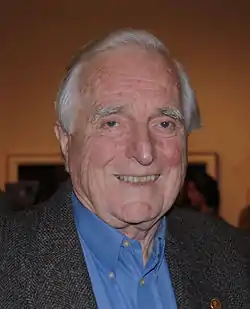
SRI's focus areas include telecommunication, computing, economic development and science and technology policy, education, energy and the environment, engineering systems, pharmaceuticals and health sciences, homeland security and national defense, materials and structures, video processing, computer vision, and robotics.[2] SRI currently employs about 2500 people,[3] and has an alumni association.[4]
SRI has had a chief executive of some form since its establishment. Prior to the split with Stanford University, the position was known as the director; after the split, it is known as the company's president and CEO. SRI has had nine so far, including William F. Talbot (1946–1947), Jesse E. Hobson (1947–1955), E. Finley Carter (1956–1963), Charles Anderson (1968–1979), William F. Miller (1979–1990), James J. Tietjen (1990–1993), William P. Sommers (1993–1998), Curtis Carlson (1998–2014), and most recently, William A. Jeffrey (2014–present). SRI also has had a board of directors since its inception, which has served to both guide and provide opportunities for the organization. The current board of directors includes Marianne Byerwalter (chairman), Charles A. Holloway (vice chairman), Samuel Armacost, Vern Clark, William A. Jeffrey (current SRI president and CEO), Robert L. Joss, Leslie F. Kenne, Henry Kressel, David Liddle, Philip J. Quigley, Wendell Wierenga, and John J. Young, Jr.[5]
Many notable SRI researchers were involved with the Augmentation Research Center. These include Principal Investigator Douglas Engelbart, the developer of the modern GUI; William English, who contributed to the design of Engelbart's computer mouse; Jeff Rulifson, the primary software architect of the NLS; Elizabeth J. Feinler, who ran the Network Information Center; and David Maynard, who would help found Electronic Arts. The Artificial Intelligence Center has also produced many notable alumni, many of whom contributed to Shakey the robot; these include project manager Charles Rosen as well as Nils Nilsson,[6] Bertram Raphael, Richard O. Duda, Peter E. Hart, Richard Fikes and Richard Waldinger. Artificial intelligence researcher Gary Hendrix went on to found Symantec. The CALO project (and its spin-off, Siri) also produced notable names including C. Raymond Perrault and Adam Cheyer.
Several SRI projects produced notable researchers and engineers long before computing was mainstream. William K. MacCurdy developed the Hydra-Cushion freight car for Southern Pacific in 1954; Hewitt Crane and Jerre Noe were instrumental in the development of Electronic Recording Machine, Accounting; Harrison Price helped The Walt Disney Company design Disneyland; James C. Bliss developed the Optacon; and Robert Weitbrecht invented the first telecommunications device for the deaf.
A
|
B
|
C
|
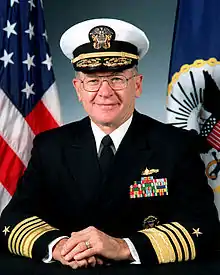 Vern Clark, Chairman of SRI's board of directors from 2010-2014. |
D
|
E
|
 |
F
|
G
|
H
|
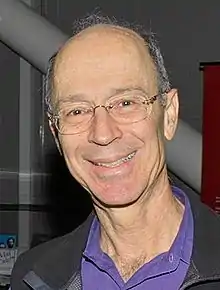 Peter E. Hart, who developed the A* search algorithm. |
I
|
K
|
L
|
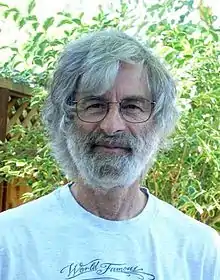 Leslie Lamport, developer of LaTeX. |
M
|
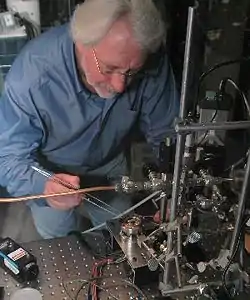 Michael McKubre working on a deuterium gas-based cold fusion cell. |
N
|
P
|
Q
|
R
|
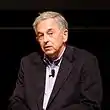 Jeff Rulifson led the team that developed the oN-Line System. |
S
|
T
|
V
|
W
|
X-Z
|
See also
References
- "SRI International Completes Integration of Sarnoff Corporation" (Press release). SRI International. 2011-01-01. Retrieved 2002-09-23.
- "Explore Our R+D". SRI International. Retrieved 2012-09-23.
- "About Us". SRI International. Retrieved 2012-09-23.
- "SRI Alumni Association". SRI International. Retrieved 2012-09-23.
- "Our People: Board of Directors". SRI International. Retrieved 2015-07-06.
- "AI's Hall of Fame" (PDF). IEEE Intelligent Systems. IEEE Computer Society. 26 (4): 5–15. 2011. doi:10.1109/MIS.2011.64.
- "Thomas J. Ahrens". American Geophysical Union. Retrieved 2012-09-23.
- "Charles Anderson". San Francisco Chronicle. Legacy.com. 2009-04-21. Retrieved 2012-07-01.
Charles Anderson Of Palo Alto, CA, passed away April 17, 2009, at the age of 91. In his lifetime he was a successful businessman, a devoted ...
- "Samuel H. Armacost, Member, Board of Directors". SRI International. Retrieved 2012-09-23.
- "Opening Statement of Dr. William B. Bader of New Jersey at his Hearing for Nomination as Associate Director of the U.S. Information Agency Before the Senate Foreign Relations Committee". University of Illinois at Chicago. 1998-10-07. Retrieved 2012-02-03.
- Pinkham, Katherine (1955-09-11). "Shirley Has Quiet Life; Enjoys The New Do-lt-yourself Craze". The News and Courier. Retrieved 2012-01-30.
- Bliss, James C. (June 1966). "Contributors". IEEE Transactions on Human Factors in Electronics (2): 107–108. doi:10.1109/THFE.1966.232331.
- Coles, L. Stephen (September 1969). "Computer-Aided Instruction using an Inferental Question-Answering System with Natural Language Input: A Plan for Research" (PDF). Artificial Intelligence Group Technical Note 11. Stanford Research Institute. Retrieved June 21, 2011.
- "SRI International Names Mariann Byerwalter Chairman of the Board and Welcomes Wendell Wierenga to Board of Directors". SRI International. Retrieved 2015-07-07.
- "William Jeffrey Joins SRI International as President and CEO". SRI International. Retrieved 2015-07-06.
- "Awards + Honors". SRI International. Archived from the original on 2012-10-03. Retrieved 2012-09-23.
- "E. Finley Carter". IEEE Global History Network. IEEE. Retrieved 2012-02-03.
- Stodola, Barbara (2011-11-22). "A Michigan City success story: Former resident Dag Kittlaus, an Elston grad, creates Siri for Apple". The News-Dispatch. Retrieved 2011-12-08.
- Boran, Marie (2011-11-16). "iRobot". The Irish Times. Retrieved 2011-12-08.
- "Adam Cheyer". SRI International Artificial Intelligence Center. Retrieved 2011-12-08.
- "Mark A. Clifton". Our People. SRI International. Retrieved 2012-12-16.
- "Mark Clifton". LinkedIn. Retrieved 2012-12-16.
- "In Memoriam: Virgil Donald "Don" Cone" (PDF). SRI Alumni Association Newsletter. SRI International. August 2011. pp. 11–12. Retrieved 2013-01-20.
- "The SRI Van and Computer Internetworking". Ed Thelen's Nike Missile Web Site. Retrieved 2013-01-20.
- Center for Oral History. "Paul M. Cook". Science History Institute.
- Cornsweet, T. N.; Crane, H. D. (1973). "Accurate two-dimensional eye tracker using first and fourth Purkinje images". J. Opt. Soc. Am. 63 (8): 921–8. Bibcode:1973JOSA...63..921C. doi:10.1364/JOSA.63.000921. PMID 4722578.
- Cornsweet, TN (August 1973). "Computer-Assisted Automated Refractions". The Australian Journal of Optometry. 56 (8): 310–313. doi:10.1111/j.1444-0938.1973.tb00727.x.
- Kelly, DH; Crane; Hill; Cornsweet (1969). "Non-contact method of measuring small eye- movements and stabilizing the retinal image". Journal of the Optical Society of America. Optical Society. 59: 509.
- "SRI Fellows Awards: 1980 – 1989". SRI International. Archived from the original on 2013-07-03. Retrieved 2013-07-01.
- Markoff, John (2008-06-21). "Hewitt D. Crane, 81, Early Computer Engineer, Is Dead". The New York Times. Retrieved 2012-04-01.
- "Alumni Hall of Fame 2008: Peter E. Hart". SRI International. Archived from the original on 2012-10-03. Retrieved 2012-09-23.
- "Recent Retirees and Other Departures of Long-Time Staff" (PDF). Alumni Association Newsletter. SRI International. August 2006. p. 10. Retrieved 2013-07-01.
- Engelbart, Douglas C., et al. (1968), "SRI-ARC. A technical session presentation at the Fall Joint Computer Conference in San Francisco, December 9, 1968" (NLS demo ’68: The computer mouse debut), 11 film reels and 6 video tapes (100 min.), Engelbart Collection, Stanford University Library, Menlo Park (CA).
- "Bill English". Computer History Museum. Archived from the original on 2012-01-04. Retrieved 2012-02-03.
- "Corporate History". SRI International. Retrieved 2013-07-01.
- "Alumni Hall of Fame 2000: Elizabeth J. Feinler". SRI International. 2000. Archived from the original on 2013-02-01. Retrieved 2011-09-23.
- Fikes, Richard E (April 1971). "Monitored Execution of Robot Plans Produced by STRIPS" (PDF). SRI International. Retrieved 2012-02-10.
- "Our People: Thomas J. Furst". SRI International. Archived from the original on 2012-10-03. Retrieved 2012-10-14.
- "Thomas J. Furst". Bloomberg Businessweek. Retrieved 2012-10-14.
- "Invited Speakers". The Fourth International Conference on Artificial Intelligence Planning Systems 1998 (AIPS '98). Retrieved 2012-02-11.
- "SRI International Senior Director Emeritus Dr. Weldon B. Gibson Passes Away in Stanford". SRI International. 2001-05-09. Archived from the original on 2011-07-20. Retrieved 2011-11-26.
- Cambell, Joseph; Elgin, Duane; Harman, Willis; Hastings, Arthur; Markley, O. W.; Matson, Floyd; O'Regan, Brendan; Schneider, Leslie (1982). Markley, O. W.; Harman, Willis W. (eds.). Changing Images of Man. SRI International. ISBN 9780080243139.
- Spicer, Dag (2004-11-19). "Oral History of Gary Hendrix PDF Document" (PDF). Computer History Museum. Archived from the original (PDF) on 2012-02-14. Retrieved 2008-11-01.
- "Dr Jerry R Hobbs". SRI International Artificial Intelligence Center. Retrieved 2012-02-05.
- "SRI International Appoints Stanford Professor Charles A. Holloway to Board of Directors". SRI International. 2003-04-23. Archived from the original on 2011-07-20. Retrieved 2012-01-27.
- "Alumni Hall of Fame: Previous Years: J. E. Hobson". SRI International. Archived from the original on 2013-07-01. Retrieved 2012-09-23.
- "History of the SWOT Analysis". RapidBI. 2012-07-28. Retrieved 2012-09-23.
- "Charles Irby". Stanford MouseSite. Stanford University. Retrieved 2012-09-09.
- "Charles Irby". Engelbart's Unfinished Revolution. Stanford University. Retrieved 2012-09-09.
- Kaelbling, Leslie Pack (1987). "Learning as an Increase in Knowledge". Technical Report, Center for the Study of Language and Information.
- "U.S. Air Force Lieutenant General Leslie Kenne Joins SRI International Board of Directors". SRI International. 2008-02-01. Retrieved 2012-09-23.
- "Our People: Thomas Kilduff". SRI International. Retrieved 2013-04-28.
- "Henry Kressel, Member, SRI Board of Directors". SRI International. Retrieved 2012-09-23.
- "Michael D. Kudlick". MouseSite. Stanford University. Retrieved 2012-11-04.
- Lamport, Leslie (2011-11-09). "The Writings of Leslie Lamport". Microsoft Research. Retrieved 2012-02-10.
- "David Liddle Joins SRI International Board of Directors". SRI International. 2012-01-04. Retrieved 2012-09-23.
- Nielson, Donald (2006). A Heritage of Innovation: SRI's First Half Century. Menlo Park, California: SRI International. pp. 6–1–6–3. ISBN 978-0-9745208-1-0.
- "William Mark". SRI International. Retrieved 2012-08-10.
- "Cognitive Assistant that Learns and Organizes". SRI International Artificial Intelligence Center. Retrieved 2012-08-10.
- David Maynard at MobyGames
- Center for Oral History. "Frank R. Mayo". Science History Institute.
- Gortler, Leon B. (21 January 1981). Frank R. Mayo, Transcript of an Interview Conducted by Leon B. Gortler at SRI International on 21 January 1981 (PDF). Philadelphia, PA: Beckman Center for the History of Chemistry.
- "Oral history interview with Frank R. Mayo". ArchiveGrid. WorldCat. 1981-01-21. Retrieved 2013-06-06.
- "Previous Years: Frank R. Mayo". Alumni Hall of Fame. SRI International. Archived from the original on 2013-07-01. Retrieved 2013-06-06.
- "Cold Fusion Is Hot Again". 60 Minutes. CBS. 2004-04-29. Retrieved 2012-02-10.
- "Faculty Profiles: William F. Miller". Stanford Graduate School of Business. Retrieved 2012-09-23.
- "About VALS: The VALS Story". Strategic Business Insights. Archived from the original on 2012-04-19. Retrieved 2012-04-15.
- "SRI's Values and Lifestyle Program". Rediscovering The North American Vision. Context Institute. Summer 1983. p. 12.
- "Alumni Hall of Fame 1999: Thomas H. Morrin". SRI International. Retrieved 2012-07-22.
- Weaver Fisher, Amy; McKenney, James L. (1993). "The Development of the ERMA Banking System: Lessons from History". IEEE Annals of the History of Computing. IEEE. 15 (1): 44–57. CiteSeerX 10.1.1.175.6002. doi:10.1109/85.194091.
- Nielson, p. 8-8 - 8-9
- "Kristien Mortelmans". SRI International. Retrieved 2013-04-27.
- "Secret Worlds: Alumna Kristien Mortelmans' Journey as a Microbiologist". The Foothill-De Anza Foundation. Archived from the original on 2013-06-16. Retrieved 2013-04-27.
- Neumann, Peter G. "Peter G. Neumann". SRI International Computer Science Laboratory. Archived from the original on 2011-05-29. Retrieved 2012-02-11.
- "Jerre D. Noe: First Chair of UW CSE: February 1, 1923 – November 12, 2005" (PDF). Most Significant Bits. 15 (3). University of Washington Computer Science and Engineering. Winter 2006. Retrieved 2013-02-17.
- "Dr Raymond C. Perrault". Artificial Intelligence Center. Retrieved 2012-01-13.
- "International Joint Conferences on Artificial Intelligence Honors SRI's Raymond Perrault with Donald E. Walker Distinguished Service Award". SRI International. 2011-07-18. Retrieved 2012-09-23.
- "Donn Parker". Computer Security Handbook. Retrieved 2012-02-11.
- "Thomas C. Poulter". History for Sale. Retrieved 2012-02-23.
- "Disneyland". Timeline of Innovations. SRI International. Retrieved 2013-07-01.
- Katz, Leslie (2010-07-19). "Star-studded celebration of Disneyland's 55th year". The San Francisco Examiner. Retrieved 2013-07-01.
- "Philip J. Quigley, Member, SRI Board of Directors". SRI International. Retrieved 2012-09-23.
- Nilsson, Nils J. (2010). The Quest for Artificial Intelligence: A History of Ideas and Achievements (PDF). Stanford University.
- "About Us". BioHarmonic Resonance. Retrieved 2012-03-02.
- Buchanan, Wyatt (2002-12-20). "Charles Rosen – expert on robots, co-founder of winery". San Francisco Chronicle. Retrieved 2012-09-23.
- "Alumni Hall of Fame 2006: Johns Frederick (Jeff) Rulifson". SRI International. 2006. Archived from the original on 2013-07-01. Retrieved 2012-09-23.
- "John Rushby Bio". Center for High Assurance Computer Systems, Information Technology Division, United States Naval Research Laboratory. Archived from the original on 2001-07-02. Retrieved 2012-03-04.
- "John Rushby: 2011 Harlan D. Mills Award Recipient". IEEE Computer Society. Retrieved 2012-03-04.
- Knight, Margaret (December 1999). "2020 Visionary". Rensselaer Alumni Magazine. Rensselaer Polytechnic Institute. Retrieved 2012-03-04.
- "Natarajan Shankar". Federated Logic Conference 2002. Retrieved 2012-03-11.
- "Natarajan Shankar, Staff Scientist, Computer Science Laboratory". SRI International. Retrieved 2012-09-23.
- "Dr. William P. "Bill" Sommers". San Francisco Chronicle. Legacy.com. 2007-01-10. Retrieved 2012-07-01.
- Nielson, Donald (2006). A Heritage of Innovation: SRI's First Half Century. SRI International. pp. F1–4. ISBN 978-0-9745208-1-0.
- Lowen, Rebecca (July–August 1997). "Exploiting a Wonderful Opportunity". Stanford Magazine. Stanford Alumni Association. Retrieved 2012-09-23.
- Luttrell, Sharron Kahn (Summer 2006). "Marty Tenenbaum '64, EE '66, SM '66". MIT Alumni Association's Infinite Connection. Archived from the original on 2010-12-06. Retrieved 2017-11-07.
- "Dean Emeritus of Stevens Institute of Technology Dr. James J. Tietjen Joins SynQuest Board" (Press release). The Free Library by Farlex. 2000-11-30. Retrieved 2012-03-04.
- "Timeline of Computer History". Computer History Museum. Retrieved 2007-02-12.
- Martin, Douglas (2004-02-08). "Oswald Villard Jr., 87; Improved Radar's Sight". The New York Times. Retrieved 2012-03-11.
- "Dr. Richard J. Waldinger". Artificial Intelligence Center. Retrieved 2012-03-16.
- "David H.D. Warren". Alumnus of the Artificial Intelligence Center. Artificial Intelligence Center. Retrieved 2010-05-26.
- Nilsson, Nils J. (1984). "Introduction to the COMTEX Microfiche Edition of the SRI Artificial Intelligence Center Technical Notes". AI Magazine. 5 (1). p. 49.
- "Robert H. Weitbrecht". Deaf Scientist Corner. Texas Women's University. Retrieved 2012-03-25.
- Hevesi, Dennis (2009-08-22). "James Marsters, Deaf Inventor, Dies at 85". The New York Times. Retrieved 2012-03-25.
- "Norman Winarsky, Vice President, SRI Ventures". SRI International. 2012-02-23. Retrieved 2012-09-23.
- "John J. Young, Jr. Joins SRI Board of Directors". 2009-09-18. Retrieved 2012-09-23.
